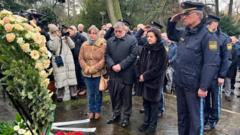In the wake of a fatal knife attack in Aschaffenburg, Bavaria, political leaders in Germany are making decisive promises regarding border control and asylum regulations. Opposition leader Friedrich Merz, who is poised to lead the nation in upcoming federal elections, has pledged to implement strict measures that could effectively close the country’s borders to irregular migrants.
The attack, which occurred on Wednesday, resulted in the deaths of a two-year-old boy of Moroccan descent and a 41-year-old man who intervened to protect children. Reports indicate that several others were also injured, escalating calls for action from political figures. An Afghan suspect, who arrived in Germany in 2022, has been charged with murder in connection with the violence.
Merz, who heads the Christian Democratic Union and currently leads in opinion polls as the February elections approach, stated that he would instruct the interior ministry to take control of Germany’s borders from day one in office. His rhetoric criticized a decade of what he termed misguided immigration policy, asserting that "we reached the limit."
The recent incident has intensified a national discussion about border security, with Chancellor Olaf Scholz labeling the attack an "act of terror," despite officials not confirming a terrorist motive. With historical context, Merz’s comments echo similar reactions seen during the 2015-16 migrant crisis when Germany accepted over a million refugees under Angela Merkel's leadership.
Responses from the political spectrum have varied, with Merz suggesting increases in detention facilities for deportation purposes, while critics caution against a populist response that might benefit far-right factions like the Alternative for Germany (AfD), which has been vocal about their immigration agenda.
Political analysts note that while mainstream parties grapple with the growing sentiment around immigration, practical coalition politics in Germany makes sweeping changes difficult. The comments from leaders such as Nancy Faeser, currently interior minister, indicate an ongoing debate regarding the framing of these issues during an election cycle, urging moderation rather than extremes.
As discussions evolve, the pain from the Aschaffenburg incident remains poignant, with the community mourning the loss of lives and rallying behind the heroism displayed during the attack.



















